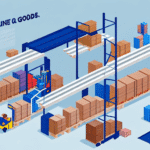The Benefits of Using Electronic Labels for Your Business
In today's fast-paced business environment, staying competitive requires businesses to streamline their operations effectively. One key strategy to achieve this is through the adoption of electronic labels. This article explores the myriad benefits of using electronic labels, including enhanced efficiency, accuracy, customer experience, security, cost savings, and environmental sustainability.
Streamlining Your Inventory Management with Electronic Labels
Managing inventory efficiently is a major challenge for many businesses. Electronic labels provide a solution by enabling real-time tracking and automatic updates of inventory levels. This ensures that businesses maintain an accurate and current view of their stock, optimizing the supply chain and preventing issues like stockouts or overstocking.
According to a 2023 industry report, businesses using electronic labels have reduced inventory discrepancies by up to 30%. These labels minimize human error by automating data entry, eliminating risks associated with manual counting or labeling.
Additionally, electronic labels can be customized to include critical information such as product details, expiration dates, and warehouse locations. This customization enhances inventory management efficiency, allowing employees to quickly locate items and ensure accurate order fulfillment.
Enhancing Efficiency and Accuracy with Electronic Labels
Electronic labels significantly reduce the potential for human error inherent in traditional labeling methods, such as typos or misplacement. By automating the labeling process, businesses can maintain precise information on products and inventory.
Traditional labeling is often time-consuming and labor-intensive, requiring manual writing or printing and physically attaching labels. In contrast, electronic labels can be swiftly created and updated via software, and applied automatically using technologies like RFID. This not only saves time and labor but also allows for real-time updates and tracking, enhancing overall operational efficiency.
The Cost Savings of Switching to Electronic Labels
Transitioning to electronic labels offers substantial cost savings. Traditional labeling incurs ongoing expenses for paper, ink, and other materials, which can accumulate rapidly. Electronic labels are reusable and durable, lasting several years, thereby reducing printing costs and minimizing waste.
Moreover, electronic labels provide greater flexibility and efficiency. Unlike manual methods that require frequent updates and replacements, electronic labels can be updated remotely and in real-time, streamlining the labeling process and reducing labor costs.
Electronic labels also enhance the customer experience by delivering detailed, up-to-date product information, such as pricing and ingredients. This transparency helps customers make informed purchasing decisions, boosting satisfaction and loyalty.
Improving Customer Experience with Electronic Labels
Enhancing the customer experience is a crucial advantage of electronic labels. Customers can easily access comprehensive product information, including pricing, ingredients, and expiration dates, either by scanning the label or using a mobile app.
Furthermore, electronic labels can offer personalized recommendations based on previous purchases or preferences, fostering increased customer loyalty and satisfaction. They can also display promotions or discounts, encouraging purchases and the exploration of new products.
The Security Benefits of Electronic Labels for Product Tracking
Product counterfeiting and theft pose significant challenges for businesses. Electronic labels enhance security by enabling comprehensive tracking of products from origin to destination, ensuring they remain untampered and secure. This reduces the risk of fraud and protects brand integrity.
Beyond security, electronic labels generate valuable data that businesses can analyze to gain insights into their supply chain operations, identifying areas for improvement and driving efficiency and cost savings.
Going Green: How Electronic Labels are Environmentally Friendly
Adopting electronic labels contributes to environmental sustainability by reducing the reliance on paper, ink, and other resources. This reduction lowers the carbon footprint of businesses and supports a more sustainable future.
Electronic labels can be updated digitally, eliminating the need for physical reprinting and minimizing waste. Additionally, by reducing the need for multiple shipments to apply or update labels, electronic labels help lower transportation emissions, further benefiting the environment.
The Future of Labeling: Advancements in Electronic Label Technology
The evolution of technology continues to advance electronic labels. Innovations such as RFID tags and NFC technology are at the forefront, enabling real-time product tracking and enhanced consumer interactions.
RFID tags allow businesses to track products throughout the supply chain using radio waves, improving inventory management, reducing waste, and preventing theft. NFC technology enables interaction with smartphones, providing customers with additional product information and opportunities for engagement, such as loyalty rewards or personalized promotions.
How to Implement Electronic Labels in Your Business
Implementing electronic labels involves selecting the right technology, creating and managing labels, and integrating them into existing systems. Partnering with a knowledgeable vendor is essential for a successful implementation.
Real-time updates are a significant advantage of electronic labels. Changes to product information, like pricing or ingredients, can be made instantly without manual intervention, saving time and reducing error risks.
Comparing Electronic Labels to Traditional Labeling Methods
Electronic labels offer several benefits over traditional labeling methods. They are more efficient, accurate, and cost-effective, making them an ideal choice for businesses seeking to optimize operations.
With electronic labels, updates to product information are instant and remote, unlike traditional methods that are time-consuming and costly. Moreover, electronic labels can provide additional information, such as nutritional facts or allergen warnings, without occupying physical space on the product packaging.
Understanding the Different Types of Electronic Labels Available
There are various types of electronic labels, each with unique advantages:
- RFID Tags: Ideal for inventory and supply chain management, RFID tags can be read from a distance without the need for line-of-sight, making them perfect for tracking large quantities of items.
- NFC Labels: Used for mobile payments and access control, NFC labels require close proximity to a reader, enhancing security.
- QR Codes: Common in marketing and advertising, QR codes can be scanned by smartphones to direct users to specific websites or product pages.
- Barcode Labels: The most basic type, widely used in retail and inventory management due to their cost-effectiveness and ease of production.
Choosing the right type of electronic label depends on the specific needs of a business.
Overcoming Common Challenges When Using Electronic Labels
While electronic labels offer numerous benefits, businesses may face challenges during implementation. Common issues include integration with existing systems, training staff, and ensuring data security and privacy.
To overcome these challenges, it is crucial to work with a reputable vendor that provides comprehensive support. Proper training and robust security protocols are essential to mitigate risks and ensure a smooth transition to electronic labeling.
Case Studies: Businesses that Have Successfully Implemented Electronic Labeling
Many businesses have successfully integrated electronic labeling into their operations, witnessing significant improvements. For instance, Walmart utilizes RFID tags to track products, resulting in reduced stockouts and enhanced inventory accuracy. Studying such successful implementations can provide valuable insights and best practices for other businesses looking to adopt electronic labels.
The Impact of Electronic Labeling on Supply Chain Management
Electronic labeling profoundly impacts supply chain management by optimizing processes, reducing costs, and enhancing visibility. Real-time tracking and data collection enable businesses to streamline operations, respond swiftly to market demands, and maintain a competitive edge.
Addressing Concerns About Data Privacy and Security with Electronic Labels
Implementing electronic labels raises important considerations regarding data privacy and security. Businesses must ensure that data is protected and that they comply with relevant regulations.
To address these concerns, businesses should collaborate with reputable vendors, implement strong security protocols, and provide comprehensive training to staff on data protection measures.
In conclusion, electronic labels offer a range of benefits that can help businesses optimize their operations and improve their bottom line. From streamlining inventory management to enhancing customer experience, electronic labels play a vital role in modernizing business practices. While there are challenges to their implementation, the advantages they provide make electronic labels a valuable investment for businesses aiming to stay competitive in today’s dynamic market.



















